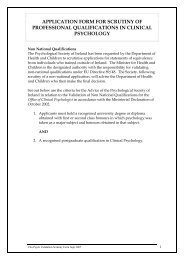Brennan Report - Department of Health and Children
Brennan Report - Department of Health and Children
Brennan Report - Department of Health and Children
You also want an ePaper? Increase the reach of your titles
YUMPU automatically turns print PDFs into web optimized ePapers that Google loves.
<strong>Report</strong> <strong>of</strong> the Commission on Financial Management <strong>and</strong> Control Systems in the <strong>Health</strong> Service3.2 CURRENT ROLE OF THE DEPARTMENT OF HEALTH AND CHILDRENThe role <strong>of</strong> the <strong>Department</strong> <strong>of</strong> <strong>Health</strong> <strong>and</strong> <strong>Children</strong> is to advise the Minister on thedevelopment <strong>of</strong> health policy. In carrying out that role, it acts as a regulator <strong>and</strong> controller inrespect <strong>of</strong> service provision. It does not manage the health service nor does it have anyexecutive function in that regard. The management <strong>of</strong> the service is devolved to variousnational executive bodies, the health boards <strong>and</strong> other statutory <strong>and</strong> voluntary agencies. Anyorganisation which is multi-layered <strong>and</strong> fragmented has substantially weakened financialmanagement <strong>and</strong> control. As a result, there is no one carrying explicit responsibility for theexecutive management <strong>and</strong> evaluation <strong>of</strong> the health system as a national service.Despite the fact that accountability for the delivery <strong>of</strong> services is located at regional <strong>and</strong> locallevel, the <strong>Department</strong> <strong>of</strong> <strong>Health</strong> <strong>and</strong> <strong>Children</strong> frequently finds itself drawn into the details <strong>of</strong>health service provision without having executive control over the service i.e. the <strong>Department</strong><strong>of</strong> <strong>Health</strong> <strong>and</strong> <strong>Children</strong> is being held accountable (wrongly) for service delivery issues withouthaving the authority to directly address the management <strong>of</strong> the service at local level. The<strong>Department</strong> <strong>of</strong> <strong>Health</strong> <strong>and</strong> <strong>Children</strong> is frequently drawn into "fire fighting" <strong>and</strong> is thereforeunable to create the space to carry out the necessary evaluation <strong>of</strong> core spending nationally.3.3 THE NEED TO EVALUATE CORE EXPENDITUREIn terms <strong>of</strong> spending on health services, the estimates process (see Appendix 4) is based onhistorical expenditure trends <strong>and</strong> is incremental in nature, although some allowance is made fordemographic changes. It has a disproportionate focus on the planning <strong>and</strong> implementation <strong>of</strong>new developments at the expense <strong>of</strong> ongoing systematic evaluation <strong>of</strong> baseline expenditure.Within the current structures, at national level there is no one in the health service carryingout this continual systematic evaluation <strong>of</strong> core service <strong>and</strong> funding.To get the best returns from the investment <strong>of</strong> taxpayers’ money in the health service, thereshould be a systematic process <strong>of</strong> monitoring <strong>and</strong> evaluating performance in terms <strong>of</strong> spending<strong>and</strong> activity at regional/service delivery level.At present the system does not have the capacity,as a matter <strong>of</strong> routine, to accurately cost <strong>and</strong> explore options.An analysis <strong>of</strong> core funding would:●●●●Permit evidence-based decision-making;Provide more accurate estimates <strong>of</strong> the true cost <strong>of</strong> providing health services;Promote closer monitoring <strong>and</strong> evaluation <strong>of</strong> the returns achieved for the resourcesinvested; <strong>and</strong>Show where best value <strong>and</strong> best practice is to be found.As presently constituted, the <strong>Department</strong> <strong>of</strong> <strong>Health</strong> <strong>and</strong> <strong>Children</strong> is focused on policydevelopment. Its engagement in the estimates process is almost entirely aimed towardssecuring development monies for new initiatives at the margin <strong>of</strong> overall health spending. Simplyput, the main focus <strong>of</strong> the <strong>Department</strong> <strong>of</strong> <strong>Health</strong> <strong>and</strong> <strong>Children</strong> is on the 3%, or so, <strong>of</strong>development funding without sufficient regard to how the 97% <strong>of</strong> core funding is being spent.The fact that the primary emphasis <strong>of</strong> the work <strong>of</strong> the <strong>Department</strong> <strong>of</strong> <strong>Health</strong> <strong>and</strong> <strong>Children</strong> ison the development <strong>of</strong> policy <strong>and</strong> services, rather than the executive management, analysis <strong>and</strong>evaluation <strong>of</strong> overall performance, is symptomatic <strong>of</strong> an inherent structural problem in thehealth service.42
















